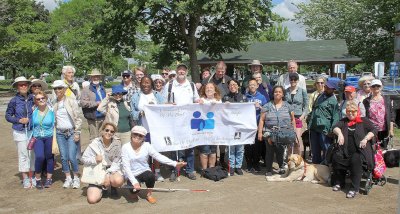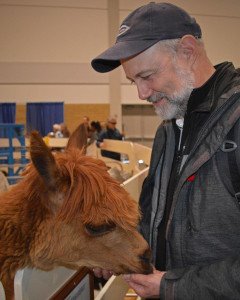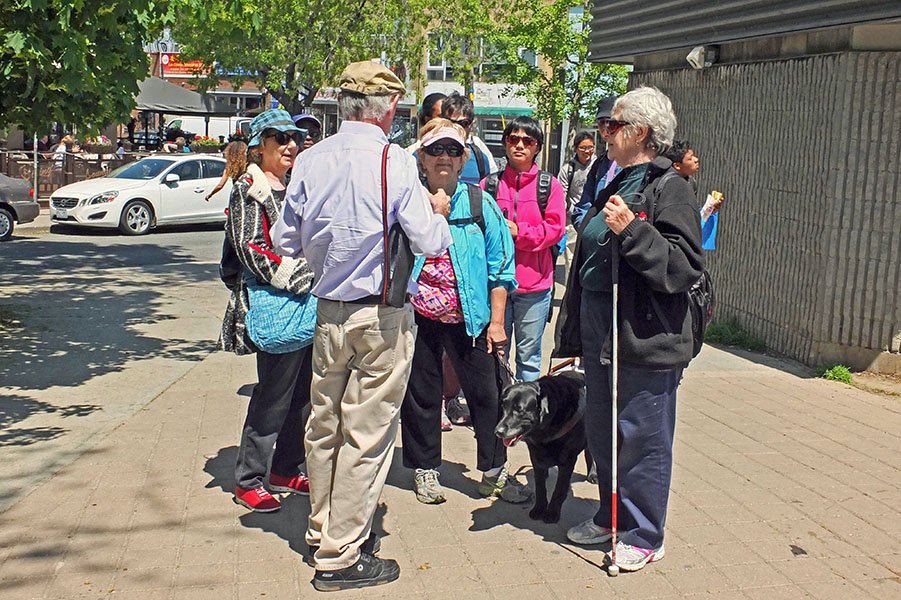Toronto Visionaries



“I had to re-imagine what I could do and how I could contribute,” says White. “There’s a complete restructuring of identity that occurs when you’re faced with a seeing disability.”
The Toronto Visionaries is a local chapter of the Canadian Council of the Blind representing the Toronto, Ontario area. It was founded by Ian White.
This year, the Canadian Council of the Blind (CCB) presented the Person of the Year Award to Ian, a fierce advocate for the visually-impaired community and a shining example of how an individual with vision loss can achieve their full potential.
Born with congenital glaucoma in Northwestern Ontario, White was raised, sighted, in Vancouver, B.C., and Oakville, Ont., moving to Toronto in 1981, where he completed a Bachelor of Applied Arts at Ryerson’s School of Interior Design (now called the Toronto Metropolitan University School of Interior Design). White worked as a designer and senior project manager for one of Canada’s premier corporate design firms. He continued to pursue a career in corporate design until 2001, when vision loss prevented him from continuing in the design sector. White’s vision had gotten progressively worse due to surgery complications, ultimately resulting in him going blind.
“How does one describe utter devastation?” says White. “My professional development and personal interests were all centered on what I could see, from my design career to my interest in art and architecture to my hobbies of reading and travelling. Beyond all that, the catastrophic thing for me about losing my vision was that every means I had for defining myself was based on what I could do, and what I could do was based on what I could see. When I lost the ability to see, I lost the ability to do, and so I lost my sense of self-identity.”
White was forced to give up his career and struggled with relating to the people around him, and with wanting to support and contribute to his family, including his four-year-old child.
“I had to re-imagine what I could do and how I could contribute,” says White. “There’s a complete restructuring of identity that occurs when you’re faced with a seeing disability.”
Fortunately, White did what needed to be done to accomplish this restructuring. He learned how to use assistive devices and technology — from a white cane to screen reader software and more — and began to engage with the world again, moving about independently and pursuing his love of reading, writing, and learning. He also began connecting with others in the vision loss community, which provided inspiration, and led him down the path to greater involvement and a leadership position within the vision loss community.
In 2011, White began volunteering with the CNIB and took training as a group leader/peer mentor for the CNIB’s New Beginnings program. That same year, he co-founded the Toronto Visionaries Peer Support Group, which was chartered as a Chapter of the CCB in 2013. The Canadian Council of the Blind (CCB) is a national registered charity with over 80 chapters across Canada, each chapter being locally organized and volunteer-driven, serving the local needs of its community. The CCB promotes peer support and acts as a consumer advocacy organization at all levels of government to defend the rights of those living with a vision disability. The CCB is the voice of the blind in Canada. As chapter President, White has overseen the Visionaries’ phenomenal growth and has encouraged the creation of several new CCB Chapters in the Toronto area, focused on group based activities. In the past 10 years, the Visionaries chapter has grown to a membership of 150, with connections and partnerships spanning the vision loss community across the GTA.
The Visionaries Chapter focuses on breaking the isolation that often accompanies vision loss by encouraging members to be inspired by their peers, by building supportive social networks through sharing information, and engaging in a wide range of social and recreational activities.
Our programs include conversation groups, book clubs, monthly Bingo, bowling and pub nights, outings to restaurants, museums, galleries, and historic sites. We arrange described walking tours, admission to live-described theatre performances, bus trips out of the city, and boat cruises in Toronto Harbour. We hold an annual 5km fundraising Walk-a-thon and Beach BBQ at Woodbine Beach, and have created the White Cane Week Experience Expo, Canada’s only consumer show for people living with vision loss. We also support a Toronto meet-up group called Get together with Technology (GTT), a user group for those interested in assistive technologies for the Blind and partially sighted.
One of the greatest challenges faced by those living with vision loss is the fact that we are a misunderstood, marginalized community. Marginalized because we represent only about 3% of the population. Misunderstood because it is almost impossible for sighted people to imagine what the lived experience of vision loss is like. They can’t imagine it, because 80-85% of everything they know they learned through their eyes. The idea of having to live without vision is simply terrifying. And they project that fear onto blind and partially sighted people. But this projected fear only gets in the way of seeing us as whole, fully-realized, interested, and interesting people. It renders us as stereotypical caricatures, as ‘disabled’, as pitiable and in need of their help. And it prevents them from allowing us to engage the world in a way that is different from the way they do.
The challenge is to be recognized as valued individuals, as people worthy of their respect – as equals. The challenge as I see it, is to fight past the assumptions of others about what we can’t do, so we can show them what we can do.
The best recommendation for saving sight is to make sure everyone visits an ophthalmologist or optometrist annually, even if you don’t think anything is wrong. Many eye conditions and diseases can be detected long before eyesight begins to diminish. Early detection and intervention can save 75% of all vision loss.
“When I lost my vision, I had no idea what blind people could do because I didn’t know any,” says White. “With the Toronto Visionaries, the initial idea was just to offer people a variety of activities to get them in social proximity of people who shared their experience of vision loss. That generates spontaneous conversations about whatever you want to talk about, whether it’s your interests, work, or leisure pursuits, which helps to break down the stereotype of what someone living with a visual impairment is capable of. And that really is the core idea behind the Visionaries — showing people that they can be whatever they want to be.”
This sense of possibility — of achieving one’s potential and embracing all that life has to offer — is reflected in White’s words and through his tireless engagement with the vision loss community. He is fuelled by the power of personal connection, and strives to help those who are struggling to adapt to a new situation and a new way of living their life, and trying to adjust to living in a world that they no longer see the way other people do.
“I’ve discovered that there’s very little that people with vision loss can’t do if they have the right tools and training,” he says. “Meeting other blind people and being inspired by them pushed me to strive to realize my potential. That’s how I got involved in volunteering, which has been a huge journey of growth and learning. I’ve realized my own potential and the value that I can bring to helping other people with their journey.”
Photo Credits: Julie Pierce and T. McFarlane

